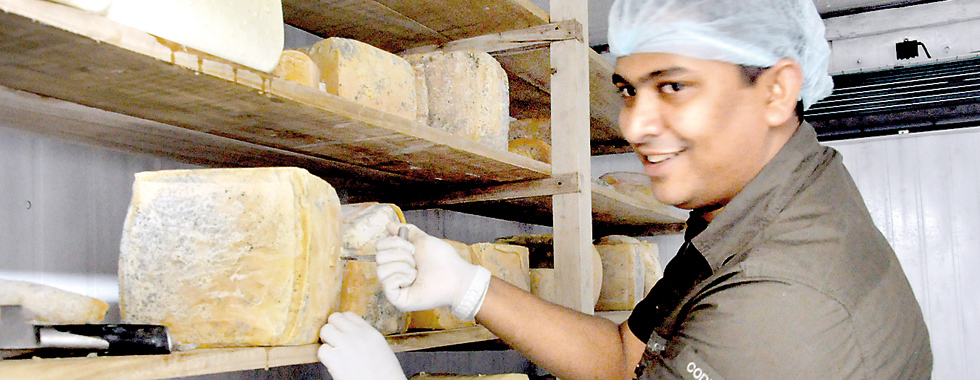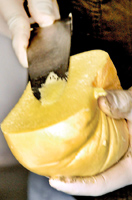Churning out cheese, a dream come true
In his cave, the cheese maker is hard at work. A burst of chilled air greeted us when he first opened the heavy door and now the floor beneath our feet is slick and cold. In the air is the faint smell of ammonia, a natural by-product of the ageing cheese. Stacked on the wooden shelves against one wall are row upon row of cheeses.

He knows them all: Jezeem with his cheeses at his Kandy workshop. Pix by Susantha Liyanawatte
Selecting one, he embeds the sharp point of his cheese iron and pulls out a long core. When he’s tested it, he uses the rind to plug the hole.
A fine blue cheese was just given away to its owner and the pecorino is sold out but he’s pleased with how the creamy edams and the affinage cheddars are progressing – there are several of each, the different hunks having been placed here at different times. They remain unlabelled, the only person who knows which is which is the cheese maker himself – Jezeem Jameel.
On his birthday this year, Jezeem decided to realise the promise he had made to himself long ago. “By the time I was 30 I wanted to be cutting my own pay check,” he says, sitting outside, on a small balcony in his home in Kandy. Cheese making wasn’t his first choice of career but it was while working as a flight steward that Jezeem first fell in love with it (and with his wife, Kaneeza.) On trips to Europe he would find time to visit artisanal cheese makers and watch them at work. He was fascinated by their wholly organic approach – they eschewed chemicals and were completely hands on, deeply familiar with every stage of the cheese’s development. (Jezeem himself does not use any artificial colours, flavours or preservatives in his cheese.)
Still, when it came to making his own cheese, Jezeem had to learn by trial and error. His first concern was the raw milk they would need in vast quantities. The quality they required wasn’t easy to come by either, particularly on a daily basis. Their search led them to a local supplier who tapped into a network of farmers, many of whom lived in isolated spots up in the surrounding hills. (Jezeem pays a premium price so that all these farmers conform to organic practices by staying hormone and antibiotic free and rearing their cattle ethically.) Now their milk comes to them just as dawn breaks and Jezeem who has been at work since 4.30 a.m. is waiting for it.

His ‘factory’ is small and his staff is made up of three local women who are the primary breadwinners for their families. When they first came to work for him they had never tasted cheese, but Jezeem has since convinced them to sample everything they produce. When they first began, much of this milk would simply be poured down the drain –unsuccessful experiments, they still cost him dearly. Little graves in his backyard hold the corpses of failed cheeses that he and Kaneeza were forced to bury. “Every aspect of everything we’ve done, we’ve had to work out by ourselves, and document it by ourselves, down to the amount of salt in our brine. That has taken us so much time and money.”
Still, every attempt brought him closer to success. Through the early mornings and late nights, Jezeem became intimate with the process of cheese making. He learned how far he needed to take the mozzarella so that his customers could wind it like string and which rinds combined with which cheeses would make the best fondue. He figured out that the milk that would be turned into haloumi had to be cultured on the spot, just feet away from the goat that produced it. Now, the brine-cured cheese squeaks in my mouth as I chew – it’s a squeak Jezeem is proud of, having experimented for months before nailing that perfect texture.
Alongside the haloumi are little servings of crumbly feta and his signature garlic chèvre. All these are made in smaller quantities but are nevertheless his best sellers. As is his personal preference, Jezeem slits a grape open and stuffs it with feta. The little parcel bursts with flavours on the tongue – the sweet, juicy grape a perfect foil for the salty, creamy cheese. When faced with a new buyer, this is what Jezeem does – he lets his product speak for him.
Nine months into his operation, his company Eyrie is thriving. Convincing the country’s gourmands of a local’s ability to produce fine cheeses has been an uphill struggle and he hasn’t always been successful. He will be visiting Colombo in the evening to take a meeting with one of the city’s foremost hotels and he’s determined to convince them to take a chance on him. He’ll use the fact that they can save some money to sweeten the deal. In the trunk of his car he intends to carry 25kgs of mozzarella – destined for the fridge of a home baker with a catering business.
Luckily, you don’t need to order in bulk to sample Jezeem’s wares. Eyrie fromargier has a stall at the Good Market in Battaramulla on Thursdays and does brisk business there. Interest is bound to grow as Jezeem is preparing to expand into yoghurt and other milk products. “People everywhere are switching out of imported dairy products. This industry is going to explode,” he says confidently. When that happens, Jezeem is counting on being at the head of the pack.
Find out more online at https://www.facebook.com/eyriecheese.
comments powered by Disqus

